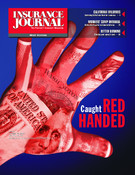Although we’ve heard it many times before, the insurance agency business is on the cusp of huge changes, driven in part by technology, a host of new and better insurance products and increased stability on the part of insurers due to regulatory scrutiny.
For insurers right now, things are “as good as it gets,” with auto and homeowners premium volume at new highs, said insurance analyst Brian Sullivan, addressing agents at the annual Professional Independent Insurance Agents of Illinois’ annual convention in Springfield. For example, in Illinois, homeowners loss ratios are 40 cents on the dollar, and many commercial lines are doing just as well, Sullivan pointed out.
The downside for agents is those markets have become stale, Sullivan said. Companies like Allstate and Progressive understand that they can’t grow by continually implementing rate cuts, so everything is in stasis.
The unexpected benefit to all of that is a new stability in the insurance market that hasn’t been evident before. Smarter insurers with fewer chances of cheating for agents means there may be rate cuts, but there is less of a chance of the crazy rate wars that characterized soft market cycles of the past. With the new transparency imposed by the Spitzer lawsuits, “insurance executives can’t lie to each other anymore about maintaining discipline (in pricing),” Sullivan said.
This “sea change” in the marketplace means independent agencies have a golden opportunity to grow their businesses by expanding into more lines of business, Sullivan noted. The demise of the insurance buyer dealing with an agent in favor of online sales has been highly exaggerated by marketing and demographic experts. While “young buyers” may very well be best served today by the GEICOs because their needs are simple, this will change as their own insurance needs change and grow more complicated through the purchase of vehicles, homes and the addition of children and wealth, Sullivan said.
For years, industry pundits have warned that no profits can be made from personal lines sales. While this may be true in a monoline situation, smart agents wsell personal lines as an adjunct to other services, including commercial lines and annuity products, he added.
Sullivan examined four lines of insurance: giant commercial accounts, large commercial accounts, midsize and small commercial accounts, and personal lines. Although giant commercial accounts are the sexiest, they are expensive business to get, and insurers make almost no money, he noted.
Large commercial business should be the “market of your dreams,” because it’s a perfect fit with midsized independent agencies. Those relationship-driven, “hand-crafted accounts” are the “Holy Grail for independent agents,”Sullivan said.
Midsize and small commercial accounts are where the most money is made and can typically be handled on a boilerplate basis. That market, which many agencies take for granted, is changing and will soon take on the characteristics of personal lines, with more questions for insurers regarding underwriting and pricing.
Leading the cutting edge for change are companies like Progressive, which sells products both direct and through agents. Although many agents hate the company because of that, the formula has proven successful. Progressive has a better product, smoother backoffice functions, and can provide more profit, even at 10 percent commissions, Sullivan indicated.
In spite of everything, insurance buyers will still and always buy on value, not price, Sullivan said. They appreciate brand, and complex relationships still need an agent’s personal touch. Monoline relationships will never be as profitable because “insurance is not a commodity,” he said. He accused insurers and agents of not talking enough about the product to potential and current clients. Using giant retailer Sears as an example, he pointed out that stores provide specification sheets on products such as dishwashers so consumers can compare brands and models. Insurers should provide similar information to prevent consumers from buying on price alone, he suggested.
Agencies also have to sell themselves, he stressed. Too often, once an agency lands an account, the client is handed off to the customer service representative, and the agent never speaks with the client again. To effectively cross-sell a variety of products, agents must establish solid relationships with clients, or risk losing them to direct writers.
One exception to the rule today is catastrophes, especially in the wake of Hurricane Katrina. “Hurricanes and earthquakes are simply not insurable” because they are currently so unpredictable with today’s technology, so cats are one area of insurance that should be handled through a federal government solution.
Was this article valuable?
Here are more articles you may enjoy.


 Chubb CEO Greenberg on Personal Insurance Affordability and Data Centers
Chubb CEO Greenberg on Personal Insurance Affordability and Data Centers  Zurich Insurance’s Beazley Bid Sets the Stage for More Insurance Deals
Zurich Insurance’s Beazley Bid Sets the Stage for More Insurance Deals  AIG, Chubb Can’t Use ‘Bump-Up’ Provision in D&O Policy to Avoid Coverage
AIG, Chubb Can’t Use ‘Bump-Up’ Provision in D&O Policy to Avoid Coverage  Lawyer for Prominent Texas Law Firm Among Victims ID’d in Maine Plane Crash
Lawyer for Prominent Texas Law Firm Among Victims ID’d in Maine Plane Crash 


